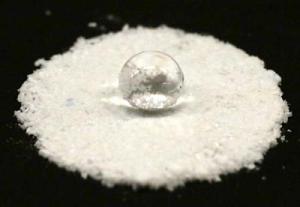Kyoto University researchers have developed a new technique to develop water-resistant functionalized materials by forming external grooves on its surface. Their study acts as a guide for scientists to design similar materials for gas separation and energy storage applications.
 This image shows bead of water sitting on top of water resistant porous coordination polymer crystals. Credit: Kyoto University iCeMS Public Relations
This image shows bead of water sitting on top of water resistant porous coordination polymer crystals. Credit: Kyoto University iCeMS Public Relations
The materials used in the research are porous coordination polymers (PCPs) - materials with hollow cage-like structures at the nanoscale. The structure of these materials includes empty cavities which can accommodate molecules, making them perfect for separating gases or small molecules from mixtures.
Masakazu Higuchi, one of the researchers involved in the study, stated that PCPs readily decompose in the presence of water, making them very unstable and difficult to apply in many situations.
The new development from Kyoto, published in Angewandte Chemie, is to create grooves on the external surface of PCPs, thereby forming an irregular waterproof surface.
The new materials using this technique have incredible stability, water-resistant properties, and maintain their ability to separate organic solvents such as toluene and benzene from mixtures.
Susumu Kitagawa, Director of Kyoto University's Institute for Cell-Material Sciences and principal investigator in this study, added:
"Our method is the first to be conducted at the nanoscale, and serves as a simpler means to maintain functional properties of PCPs while preventing them from breaking down in the presence of water."